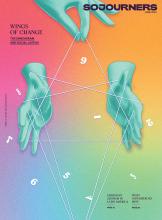IN HER POEM “Flare,” Mary Oliver writes about grief and the relationship between memory and reality, especially when it comes to parents. She writes: “My mother / was the blue wisteria, / my mother / was the mossy stream out behind the house, / my mother, alas, alas, / did not always love her life, / heavier than iron it was / as she carried it in her arms, from room to room.”
Our relationships with parents are shaped by our memories, what parents tell us about their lives, and what we come to understand about them. The Bible tells us to honor our father and mother, but we can never do that perfectly because we never fully know them. This becomes more poignant when those who raised us are no longer around.
Like Oliver’s poem, Joanna Hogg’s The Eternal Daughter (available on video on demand) captures this liminal, lonely feeling in an intensely personal way. Hogg’s semi-autobiographical film is a ghost story about memory, family, and the pull between the stories we know, the ones we don’t, and unresolved ways they differ.
Read the Full Article

